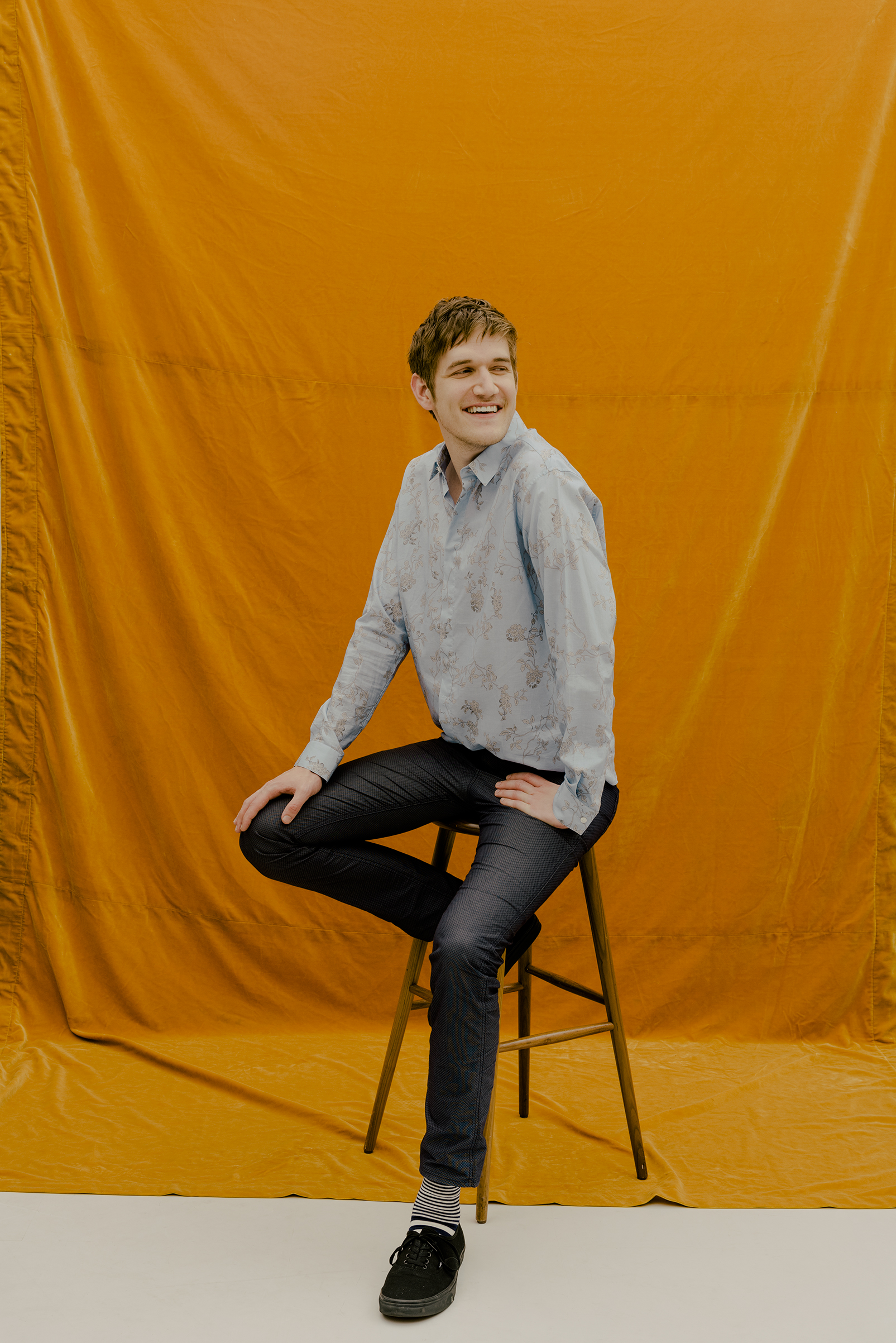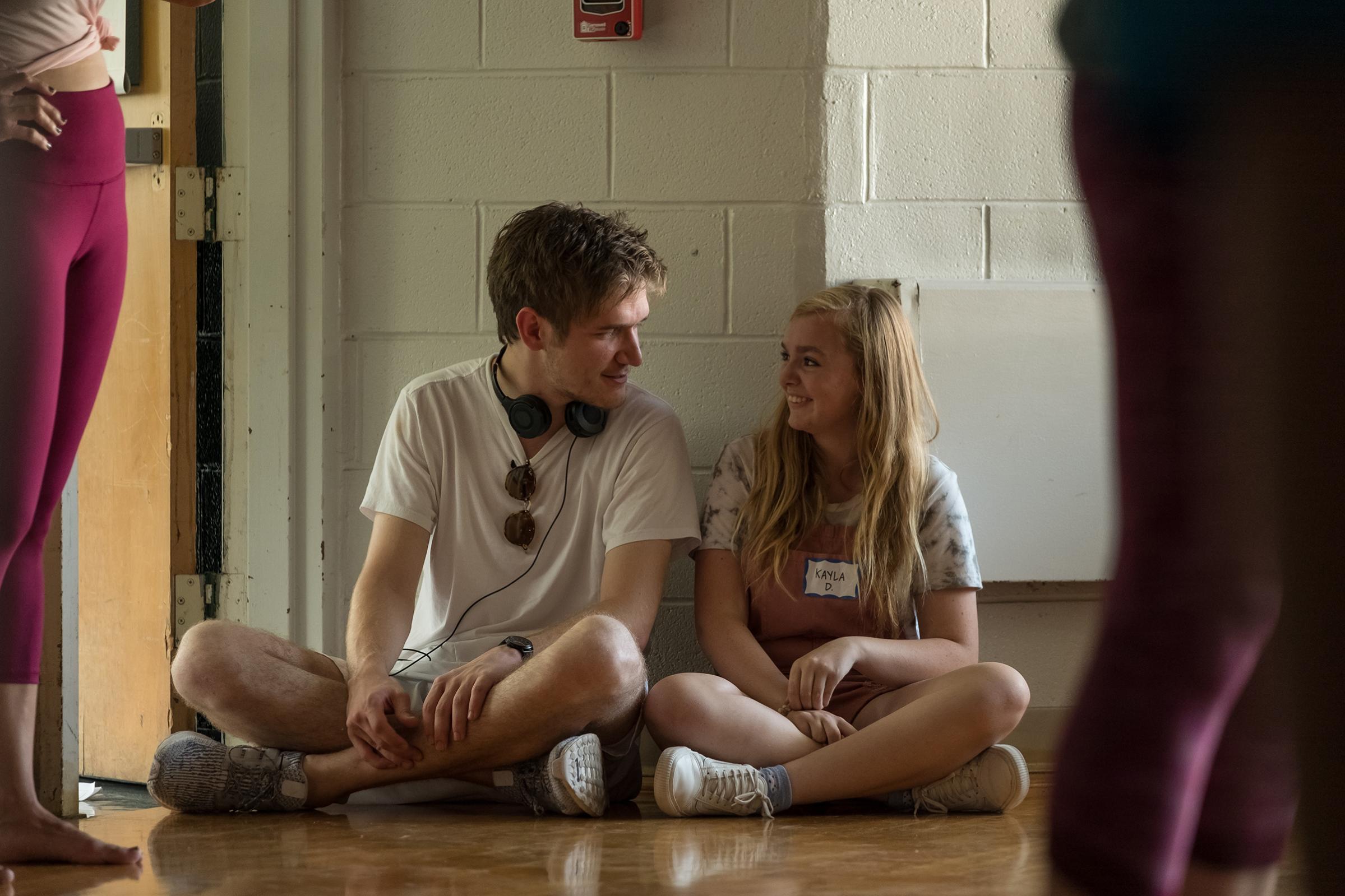“This is a very sad and beautiful story,” says Bo Burnham. We are watching an instructional video on how to tie a necktie. The narrator is pointing out the skinny and fat ends of the tie, and noting that choosing a length is a difficult step. It’s part of an exhibition on Internet videos at the Museum of the Moving Image in Queens, which also includes porn, zit popping, ASMR and something Burnham calls “established cute boy” videos. Yet it’s the over-explained tie tying that seems to affect him the most. He’s imagining the type of person for whom this kind of detail on a simple skill from a disembodied stranger is necessary. Why would someone not have a human to teach them this?
The Internet has diverse effects on its users. For many of those raised as digital natives, it has sown discord, disconnection and dissociation. For Burnham, 27, it has increased his humanity.

A star on YouTube by 16, thanks to a series of witty songs that went viral, Burnham is deeply familiar both with almost every genre of Internet video and the effect of being watched. He has mined those experiences as the writer and director of his first feature film, Eighth Grade. It’s the story of the dignity-destroying last week of middle school for Kayla (Elsie Fisher), voted Most Quiet in her grade. She has a whole different persona on her YouTube channel, but nobody notices her there either.
All the classic middle-school indignities are represented: Kayla has a crush on a shallow classmate whose Instagram account she scrolls through and who consents to talk to her only under a desk during a darkly hilarious drill for a school shooting after she fibs that she has naked selfies on her phone. At home, her bewildered single father interrupts her pressing screen-related duties with lame questions about her day. She’s fighting a battle with her own self-loathing on- and offline. For most of the movie, it’s a draw.
What business does a 27-year-old white male comedian with 1.4 million subscribers to his YouTube channel, a best-selling book and two Netflix comedy specials to his name have in telling the story of a 14-year-old girl with blighted skin and zero friends in an age when identity is so proprietary? Next to none. And yet Eighth Grade has already won several festival awards and a number of critics’ hearts. (The 17-year-old who accompanied me to a screening said it was so accurate, it should come with a trigger warning.) Burnham also directed Chris Rock’s last comedy special. (The one about his divorce.) He seems to have a way of illuminating that which is commonly painful in the human experience.
“I wanted to talk about social anxiety and loneliness,” he says of the movie as he moves smoked salmon onto and off and back onto his bagel over breakfast. He thinks middle schoolers are at that last point at which humans are genuine, before they master social techniques that camouflage their infirmities and create an acceptable front. “At that age, it’s like you’re building that parachute as you’re falling,” he says. “It’s like the lights have just been turned on and you’re like, ‘Oh my God! Have I been like this all the time? And people can see me?'”
Burnham also chose middle school because he wanted to talk about the Internet, and these are the individuals who have been formed by it. When he started on YouTube in 2007, he says, it didn’t change his life much. But so much of today’s eighth-graders’ lives are lived on and through the screen that it has become a whole other existence they have to maintain and nurture and burnish, like a high-stakes Tamagotchi. The burden of that is also a lifeline: if teens fear their lives look pathetic in reality, they can create the illusion online that they’re doing fine. Burnham is fascinated by how teen girls in particular use it as an emotional-support vehicle. “Be. More. Confident,” Kayla advises her nonexistent audience as she struggles to do that exact thing.
Weirdly, Burnham refined a lot of his understanding of eighth grade by practicing that most sociopathic of the arts: stand-up comedy. Extreme social discomfort? He can do that. In one of his Netflix specials, Make Happy, he does a call and response with the audience about white-people food: “Peanut butter and ____!” “Mac and ____!” “And our favorite flavor of chips is salt and vin____!” Then he brings the house lights up to expose those who inadvertently said the N word, many of whom look terrified.

One of his other specialties is a kind of musical meta-joke; he sings a country or pop song in which the lyrics point out all the artificial things those genres do to lure people in: “Hear that hint of mandolin?/ That’s a sign of pandering.” Or he’ll fumble his bottle of water, and a second later a soundtrack will riff on how the fumbled-water thing was choreographed and how art is a lie. “I wanted to be honest onstage, so I started talking about performing, because that’s the only thing I could do,” he says. “And then I found 14-year-old girls coming up to me after shows saying, ‘I feel exactly like you do.'” While many a young male comic might have been horrified at the connection and changed his act, Burnham realized that because of the omnipresence of lenses and videos in their lives, young girls in particular feel like they’re performing all the time. “If there was a bridge I had to walk to write this story, it was built by them to me first,” says Burnham. “I felt personally understood by girls like Kayla before I presumed to understand them.”
For his lead actor, playing a character written by a 27-year-old guy wasn’t nearly as weird as working with someone who is 6 ft. 3 in. “I knew he was, like, an adult. But it was never very apparent,” says Fisher, 15. “He was more like a friend.” The only part of the script that felt wrong to her was that all Kayla’s online messages were on Facebook; she made him change it to Instagram. “In my eyes, this wasn’t a man writing about a teenage girl,” she says. “It was just a person writing about another person who feels the same stuff.”
Burnham stopped doing stand-up in 2016. While he had always been an anxious child, in 2013 he had an acute panic attack onstage–tunnel vision, shortness of breath–and then endured every performance in dread of another. “It was the roughest time in my life that last tour–the roughest,” he says. “It felt like every night onstage there was just a f-cking ax hanging over my head and at any point this thing’s going to f-cking drop. And, like, I’m going to faint onstage and someone’s going to video it and post it everywhere.” Make Happy closes with a Kanye West parody song, with these lyrics: “Come and watch the skinny kid with the steadily declining mental health/ And laugh as he attempts to give you what he cannot give himself.”
All of this might lead one to suspect that Burnham had a difficult childhood. But the opposite appears to be the case. His mother Patti is a hospice nurse who took time off from serious practice to “hand out lozenges,” as Burnham puts it, as a school nurse at a suburban Boston private school so that Bo and his older brother Peter could attend for free. He speaks with unguarded admiration of her and channeled her for a remarkable scene where Kayla’s father tries to explain to his daughter what it’s like to be her dad. “I’ve been lucky enough to hear things like that,” says Burnham, “from a very well-meaning, emotionally intelligent person who might not have the exact words for it but can really articulate their intention.” Burnham’s father Scott has a construction/real estate business that employs both of Bo’s siblings. Perhaps to even things out, the website of Burnham Construction also has a few random photos of Bo performing amid the customer testimonials.
Burnham’s panic attacks have subsided, and he lives peaceably in Los Angeles with his girlfriend of five years, the writer-director Lorene Scafaria (Seeking a Friend for the End of the World), who’s a decade or so older and further along in her career and whom he credits with showing him some of the Hollywood ropes. But his nerves are still a propellant for his work ethic. “The way he channels his anxiety into a laser-like focus for what he’s going after is quite amazing,” says Josh Hamilton, who plays Kayla’s dad. “His motor thrums at a higher level than most of us.”
What seems to set Burnham apart from the other creative forces of his age is his high empathy quotient. That’s how he can get inside the head of a 14-year-old girl, a parent or a person who needs the Internet to teach them how to dress. That’s how he understands so well what makes people cringe. He once counseled a comedy crowd to avoid living their lives in front of an audience. Let’s hope he doesn’t take his own advice.
More Must-Reads from TIME
- L.A. Fires Show Reality of 1.5°C of Warming
- Home Losses From L.A. Fires Hasten ‘An Uninsurable Future’
- The Women Refusing to Participate in Trump’s Economy
- Bad Bunny On Heartbreak and New Album
- How to Dress Warmly for Cold Weather
- We’re Lucky to Have Been Alive in the Age of David Lynch
- The Motivational Trick That Makes You Exercise Harder
- Column: No One Won The War in Gaza
Contact us at letters@time.com